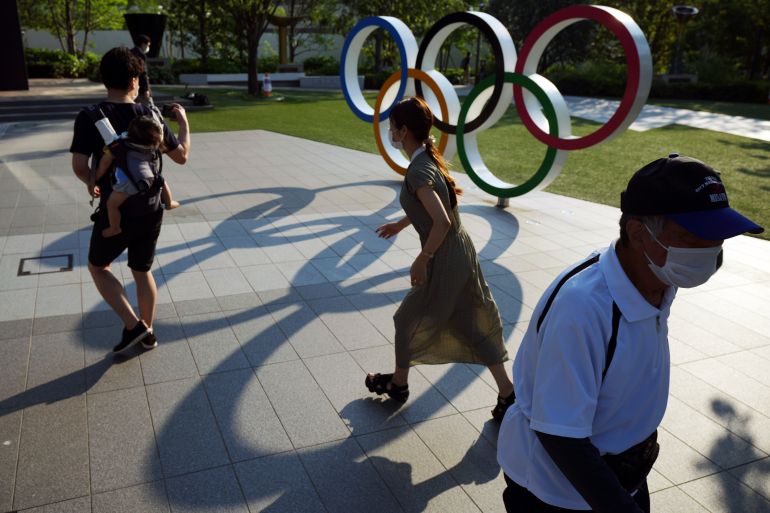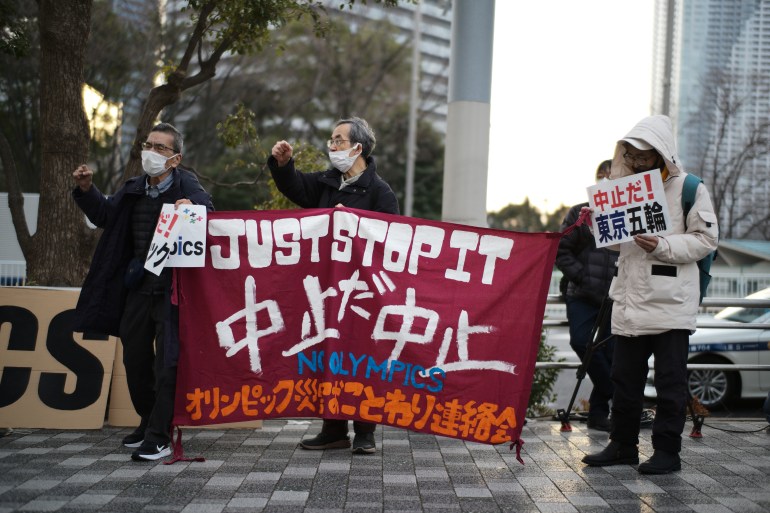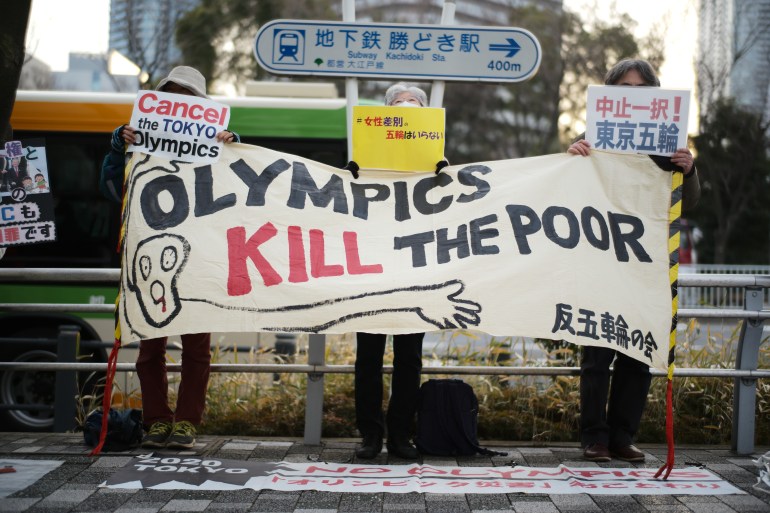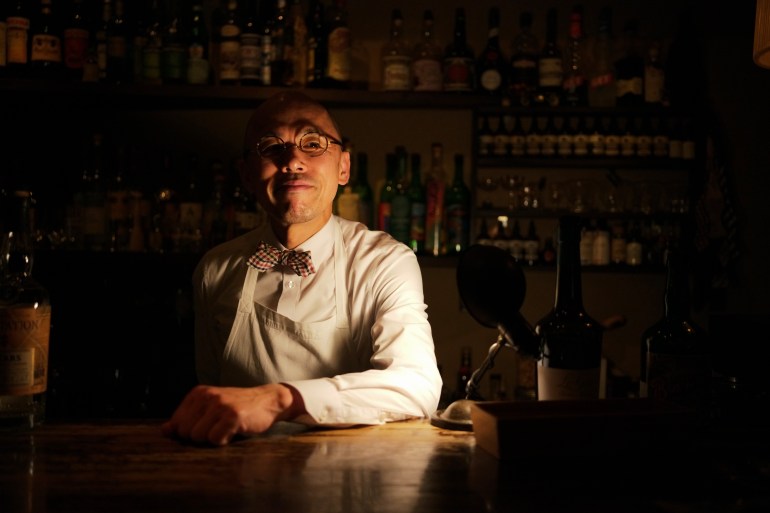COVID-wary Japan gingerly approaches Olympics starting line
Japanese public fears influx of 93,000 Olympic visitors could worsen the country’s ongoing COVID-19 outbreak.

Tokyo, Japan – In front of the red-brick walls of Tokyo Station, a digital clock counts down the days to the Olympic and Paralympic Games. Banners carrying the five Olympic rings hang from lamp posts above it, while shops in the area are stocked full of shirts, posters and keychains bearing the same insignia.
Across the Japanese capital, the trappings of the Summer Games are impossible to ignore, but the excitement that usually comes from a sporting event of this scale appears largely absent.
Keep reading
list of 4 itemsUganda Olympic team member tests positive on arrival in Japan
How safe are the Tokyo Olympics from COVID-19?
IOC seeks to allay Tokyo Olympics fears amid cancellation call
Barely a month remains until the opening ceremony of the Tokyo Olympics on July 23. But the Japanese public remains resolutely opposed to the Games, amid fears that the influx of athletes, sport officials and journalists could worsen the continuing COVID-19 outbreak in Tokyo and other parts of the country.
The International Olympic Committee (IOC) and Tokyo 2020 organisers, however, remain steadfast in their resolve to continue with already delayed Games. The competition is now shaping up to be the most expensive Olympics ever and will be the first to take place during a pandemic.
The final preparations for the event are taking place even as anti-virus measures remain in place in large parts of Japan, but Olympics organisers and the Japanese government are promising stringent protocols to prevent the 93,000 Olympics visitors from worsening the country’s outbreak.
They say the Games will serve as a beacon of humanity’s resilience and its supposed triumph over the pandemic.
But for all the steps that have been taken to make good on those promises, the questions still outnumber the answers.
Spectators from abroad have been barred from attending, and on Monday organisers said capacity would be set at 50 percent with a maximum of 10,000 people for the 3.6 million domestic ticketholders.
Organisers have meanwhile published a “Playbook” that lays out the protocols that athletes, officials, journalists and volunteers will be subject to – including daily tests for the 15,000 athletes flying in for the Games, as well as GPS trackers on foreign media personnel to ensure they remain within designated areas in the city – but scepticism abounds on how well the rules can be enforced and to what extent the tracking systems will work.
‘It doesn’t make sense’
Doctors and healthcare workers have emerged as the strongest voice of opposition to the Games, touting concerns that a surge in infections could overwhelm Japan’s healthcare system.
“Front-line medical workers are being treated as disposable,” said a 27-year-old nurse working at Komagome Hospital in Tokyo.
The nurse, who asked to speak anonymously, said nursing, which was already a physically and emotionally draining job, had been made unbearable for many by the pandemic. She said many of her coworkers and peers had quit during the past year and a half.
“To host an event like the Olympics at a time like this, as if to mark the end of the pandemic, which is very much ongoing,” she said. “It doesn’t make sense.”
Japan has recorded more than 785,000 cases of the coronavirus since the beginning of the pandemic, and 14,385 deaths – a toll much lower than most industrialised countries. Still, the country’s healthcare system has buckled under four different waves of the pandemic.
In March this year, more than 100 doctors abruptly quit across three hospitals operated by the Tokyo Women’s Medical University. Last year, more than 400 nurses had threatened to quit at the same hospital due to the added strain the pandemic put on staff, and the hospital’s reluctance to take on more staff.


And in May, hospitals in Japan’s second-largest city of Osaka were pushed beyond capacity, when bed occupancy exceeded 100 percent for a number of weeks.
While civil society groups, doctor’s unions, private companies and even a few major newspapers in Japan have voiced their opposition to the games or called for them to be cancelled, it was the central government’s foremost infectious disease expert who made the most headlines.
On June 2, Shigeru Omi, chair of the government’s coronavirus subcommittee said that “normally, the Games wouldn’t be held under these circumstances”.
While it is difficult to measure the possibility of a super-spreader event because of the games, health workers fear the burden the sporting event could put on the capital’s healthcare system.
“The risks probably aren’t as high as people fear, but an uptick in the number of severe cases could cause a panic in Tokyo and overwhelm the city’s hospitals,” said Satoru Hashimoto, director of the intensive care unit of the hospital of the Kyoto Prefectural University of Medicine.
“An outbreak in the capital could spread throughout the country and eventually lead to a fifth wave of the pandemic. It’s not a scenario I like to imagine.”
Fears of a new emergency
Japan has struggled to stamp out the virus because its infectious disease laws — bound by a post-war constitution that rigidly protects personal freedoms during national crises — remain largely voluntary. In other words, it is impossible for the Japanese government to legally compel people to stay indoors, or for prefectural governors or city mayors to implement the kind of hard lockdowns imposed in other countries.
Still, the emergency measures appear to have driven down infections nationwide, with cases falling from a peak of 7,000 in mid-May to fewer than 2,000 at the beginning of June.
The country’s third state of emergency ended in all but one prefecture on June 20. The order will remain in place in Okinawa and quasi-emergency measures in nine prefectures – including Tokyo – until July 11.
But the easing of coronavirus measures less than two weeks before the opening of the Olympics has prompted unease.
Earlier this month, a team of researchers led by an infectious disease expert advising the health ministry published a study showing that, if Tokyo were to see a surge of infections similar to that seen in Osaka in April and May, when more than 1,000 people were testing positive every day, the capital city could see another state of emergency as early as August.
“A state of emergency longer two months would be necessary to contain a wave of infections and prevent a collapse of the healthcare system,” the report said.
The IOC – in a bid to allay concerns about the potential strain on Japan’s healthcare system – said in March that it was prepared to dispatch additional medical staff to Tokyo. That’s in addition to staff at the nine hospitals that have been designated to treat athletes should they get injured and the 500 nurses who will be recruited to voluntarily work on daily rotation at sport venues.
But local doctors and health organisations have pointed out that none of the medical staff from abroad would be able to practice medicine in Japan legally without a licence issued in the country, and have urged the IOC and the Japanese government to reconsider their plans to divert precious medical staff and resources during the pandemic.
Vaccinations
Another factor fuelling public opposition is the sluggish pace of Japan’s vaccine rollout.
As of June 16, more than 15 percent of Japan’s 126 million people had received their first dose of the vaccine. Prime Minister Yoshihide Suga’s government plans to vaccinate people aged 65 and above, who account for nearly a third of Japan’s population, by the end of June and complete inoculation of all the country’s residents by November.
The IOC has also said 80 percent of athletes and possibly 80 percent of all participants in the games will be inoculated.
Ayaka Kurasawa, an occupational therapist in Tokyo, said she was opposed to holding the Games despite receiving two doses of the COVID-19 vaccine because it was not yet clear how effective the jabs were at preventing infection and transmission with new strains of the virus.
“The medical field is still in a difficult situation,” she said. “I think it is necessary to reduce cases until the healthcare workers can get enough rest.”
It is not just health workers who are opposed to the pandemic.
Even the very businesses that hoped Japan’s idling economy would get a jumpstart from the Tokyo Games, are now concerned it could set off another wave of COVID-19, and trigger a fresh set of restrictions that would deepen their economic woes.
“Now isn’t the time to be hosting an event like the Olympics or Paralympics,” said Yasuhiro Hasegawa, 50, who has owned and operated a bar in Tokyo with his wife for more than 20 years.
The couple closed the bar completely during Japan’s first state of emergency – which lasted from early April to late May last year – and closed early at 8pm every day during the second earlier this year.

During the country’s third state of emergency, which was declared in late April but has been extended three times and expanded three times, the bar has remained open despite requests by the Tokyo Metropolitan Government for dining establishments to close early or stop selling alcohol.
“All this time and money is being spent on the Tokyo Games,” Hasegawa said, “when it should be used to support local businesses, help the economy recover and enforce stronger virus prevention measures.”
‘Democracy deficit’
Despite the growing calls for cancellation or postponement, in principle, it is the IOC that has the sole authority to cancel the Olympics based on its contract with the host nation. But there is a single, rather ironic precedent of a host nation triggering the cancellation of the Games dating back to 1938, when Japan forfeited the event scheduled for 1940 as World War II loomed.
But stakeholders, many of whom bet big on the marketing potential of the Games, can no longer back out without incurring huge financial losses.
Japan has already spent at least $14.5bn on the Games and an audit by the Japanese government showed the expenses are actually higher. The cost of the games could reach as high as $25bn, making the Tokyo Summer Games the most expensive ever, according to Oxford University.
It is Japan’s central government and the Tokyo Metropolitan Government that will shoulder all but $6.7bn in private operational funding. And if the event is called off, the Japanese government stands to lose most in the form of taxpayer money.
“The Olympics bring with them a democracy deficit,” said Jules Boykoff, a professor in politics at Pacific University, in Oregon in the United States.
“I’m concerned for the people of Japan,” said the scholar, who is an expert on the history of the Olympic and Paralympic Games and a former Olympic athlete himself. “That they’re not going to be considered the priority, and that instead, the International Olympic Committee’s own interests, just based on history, will be considered the priority.”
More often than not, support of the Tokyo Games has largely correlated with the ebb and flow of the pandemic. When cases go up, fewer people in Japan want to host the games, and vice versa.
As early as May, several polls showed that up to 80 percent of respondents believed the Games could not be held safely, should be postponed again or cancelled altogether. But as cases decreased and the pace of vaccinations increased, one poll published earlier in June showed that roughly 55 percent called for the Games to be postponed or cancelled, while 44 percent said the event should go ahead.
Respondents were more evenly split in a different survey, in which half of respondents said the Games should go on while 48 percent said they should be cancelled.
The public is probably feeling a combination of excitement about the Games and resignation that cancellation is growing increasingly unlikely, said Kenneth McElwain, professor in the University of Tokyo’s Institute of Social Science.
“The good thing about the opposition,” McElwain said. “Is that it’s making the government be stricter.”
Even if people calling for the games to be cancelled don’t get what they want, he said, “the net result will be a safer Olympics.”
Additional reporting by Tamayo Muto